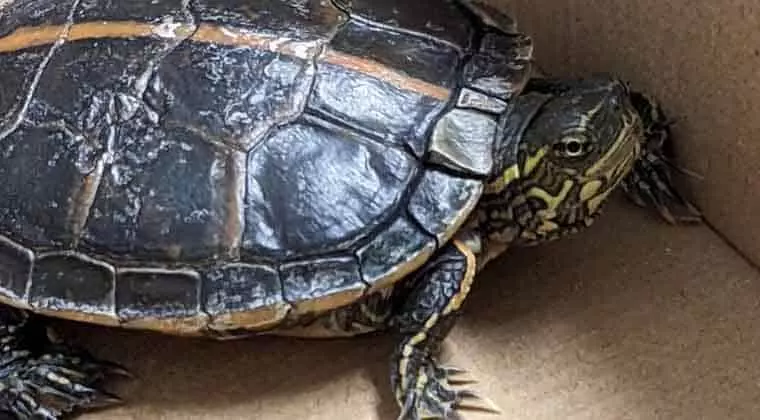No, turtles do not have periods. A period is a term used to describe the monthly reproductive cycle in female mammals in which an egg is released and a lining of the uterus builds up, preparing for a possible pregnancy. This process does not occur in turtles as they are reptiles rather than mammals and therefore lack this type of reproductive system.
Instead, turtles lay eggs without any involvement from male counterparts and without undergoing any kind of hormonal cycle like those experienced by mammalian females during their menstrual cycle.
How Long Are Turtles Pregnant For?
Turtles are unique animals and the length of their pregnancy varies depending on the species. Generally, turtles will carry their eggs for between two to three months before they hatch. This process usually begins with a female turtle digging a nest in sand or soil where she will lay her eggs.
Depending on the temperature and other environmental factors, it can take anywhere from 45-90 days for the eggs to hatch after being laid by the female turtle. The incubation period is very important as it helps determine how developed and healthy the baby turtles will be when they emerge from their shells.
During this time, temperatures must remain stable so that young turtles develop properly inside their eggshells before hatching into adulthood. Turtles typically start breeding in late spring or early summer which means that most sea turtle species should have hatched by mid-summer when conditions become favorable for them to survive in the wild.
Do Female Turtles Lay Eggs Without Mating?
Yes, female turtles can lay eggs without mating. This phenomenon is called parthenogenesis and it occurs when a female turtle produces an egg that has not been fertilized by a male. The eggs are produced through the process of meiosis, which is the same type of cell division used in sexual reproduction.
However, due to this lack of fertilization, the genetic material within these eggs only comes from one parent. In this case, the mother turtle means that any offspring will be clones of their mother. Parthenogenesis has been observed in some species of turtles including common snapping turtles and softshells; however, it remains relatively rare among these animals with most females still relying on physical contact with males for successful breeding seasons.
Do Turtles Have Feelings?
Turtles are beloved creatures in many cultures, so it’s only natural to wonder if they have feelings. The answer is complicated and not entirely clear. While most scientists agree that turtles do not experience the same range of emotions as mammals, there is evidence that they may be capable of feeling certain things such as pleasure or fear.
For example, some research has indicated that turtles respond positively to being stroked on their shells and can recognize familiar people by sight or smell. They also appear to become stressed when exposed to loud noises for too long and need time alone after being handled a lot. Additionally, it seems like they engage in social behavior with one another which could indicate an ability to form bonds with other members of their species.
How Does a Turtle Reproduce?
Turtles, like many other animals, reproduce sexually. Male turtles have a single penis on the underside of their tail that can be extended to mate with a female turtle. During mating season, male turtles will search for mates by swimming around and sniffing out females in the area.
Once they find one they are interested in, they will often attempt to court her and compete with any other males attempting to mate as well. The actual act of mating involves the male inserting his penis into the female’s cloaca (a common opening used for reproduction) until sperm is transferred from him to her. This process can take anywhere from a few minutes up to an hour depending on the species and individual traits of each turtle involved.
After successful mating has taken place, eggs will form inside the female’s body which she then lays in burrows or shallow holes dug near water sources or land areas where it is safe enough for them to incubate without being disturbed or damaged by predators or environmental factors such as extreme heat or cold temperatures. Depending on the species again, these eggs may take anywhere from 45-120 days before hatching into newly born baby turtles!
Tortoise Laying Eggs
Conclusion
This post has shown that turtles do not have periods in the same way that mammals do. Rather, they lay eggs at certain times of the year, and those eggs contain a yolk that provides the necessary nutrition for their young to develop. This process is essential for the survival of turtle species and helps them thrive in diverse environments around the world.
While turtles may not have traditional menstrual cycles like humans, they still play an important role in our ecosystems by providing food sources, aiding pollination efforts, controlling pest populations, and more.
